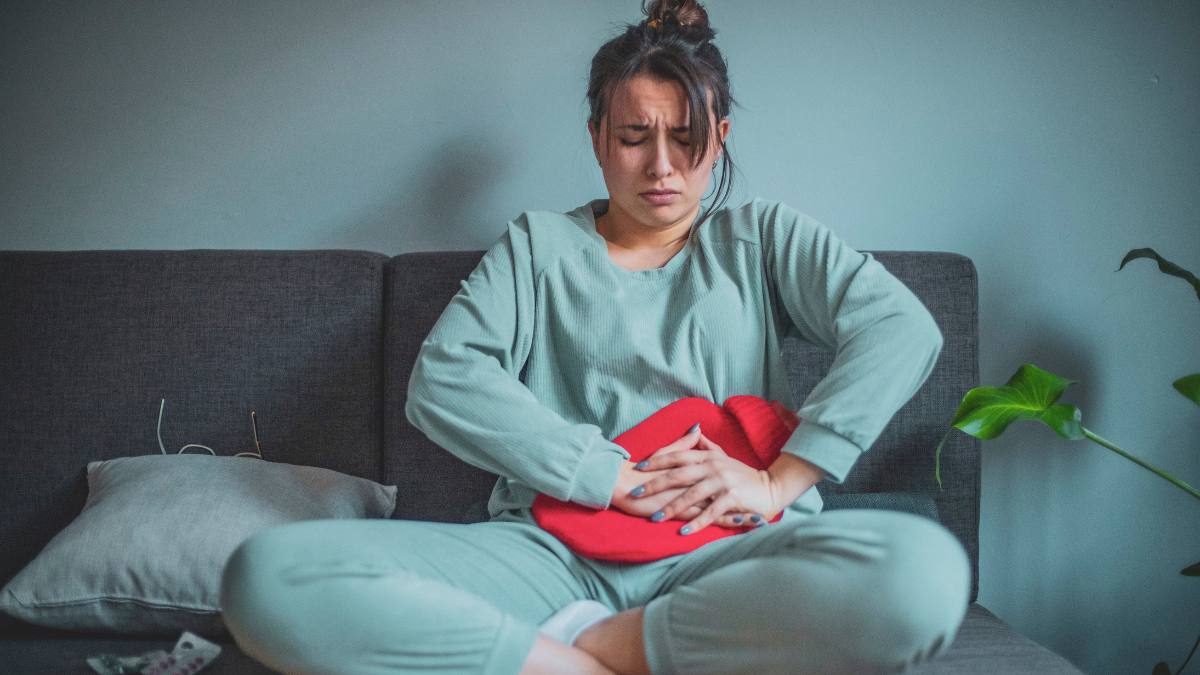
Period cramps are never fun. They can range from a minor inconvenience to a stubborn ache that radiates through your lower back and makes you want to curl up on the couch. And while over-the-counter pain relievers can help, natural remedies for cramps also provide that much-needed relief. Here, doctors reveal who’s more likely to suffer from cramps and the best ways to reduce menstrual pain at home.
Some conditions can worsen menstrual cramps
Menstrual cramps, known medically as dysmenorrhea, are incredibly common and affect upwards of 84 percent of women. “They occur due to the contraction of the uterus as it sheds its lining during a period,” explains Michael Chichak, MD, medical director at MEDvidi. “These contractions are triggered by prostaglandins—hormone-like substances that are involved in pain and inflammation.”
What menstrual symptoms bother you most?
If you have higher levels of prostaglandins (which can stem from issues like chronic inflammation or following a western diet), the uterine contractions are likely to be stronger and more intense. Dr. Chichak notes that while cramping is a normal part of menstruation, “factors such as underlying conditions (like endometriosis or uterine fibroids) can exacerbate the severity of the pain.”
The good news? Menstrual cramps tend to lessen with age and after giving birth, according to the Mayo Clinic.
The best natural remedies for cramps
While OTC medications like ibuprofen (Advil) are safe and effective for most, Alyssa Dweck, MS, MD, FACOG, MSCP, gynecologist, author and reproductive health expert for INTIMINA, notes that some people prefer to or have a medical indication to avoid them when possible. “Many natural remedies are more easily accessible, less expensive and still effective,” she says.
As for how often to use natural remedies for menstrual cramps? Dr. Dweck recommends planning ahead if you know you experience them. “Whether with a written calendar or high tech app, anticipating menses and timing of cramps can make all the difference in managing pain before it starts or at least before it becomes severe.”
She suggests starting measures, either natural or medication or both, a few days before you’re expected to begin your menstrual cycle. “Pain will usually diminish and resolve within a few days of menstruation, so these can be taken or used for the length of time needed for the individual,” adds Dr. Dweck.
Here, the best natural home remedies to ease menstrual cramps:
Apply a heating pad
Heat therapy in the form of a heating pad, hot water bottle or even a warm bath can work wonders for cramps. “Heat naturally causes increased blood flow through vasodilation, or dilation of blood vessels,” says Dr. Dweck. “Increased blood flow relaxes muscles and can help with muscular pain and cramps.”
Practice light stretching
Sometimes, the last thing you feel like doing is moving around while on your period. But Dr. Dweck says that gentle exercise or light stretching can actually help relieve menstrual cramps. Like the heating pad remedy above, soothing movement improves circulation, which calms muscle pain and cramping.
Dr. Chichak adds that activities such as yoga, walking or gentle stretching can promote the release of endorphins, also known as the body’s natural pain relievers. “Endorphins counteract prostaglandins and reduce pain sensations,” he says.
Sip herbal tea
“Chamomile has antispasmodic and anti-inflammatory properties, which can reduce the intensity of uterine muscle contractions,” says Dr. Chichak. “Ginger tea, on the other hand, helps lower prostaglandin levels.” He recommends drinking one or two cups daily during your period to help relax muscles and reduce inflammation naturally.
Reach for anti-inflammatory foods
Dr. Chichak points out that eating foods like fruits, vegetables, nuts and fish high in omega-3 fatty acids can help reduce inflammation and cramping. A proper diet will also help keep your hormone levels balanced.
Also smart? Scaling back on processed foods and sugary snacks (they can trigger inflammation), salty foods (they can cause bloat and inflammation) and caffeine and alcohol (they constrict blood vessels and increase the risk of dehydration).
Make time to unwind
Stress can exacerbate cramps by tightening pelvic muscles, says Dr. Chichak, so it’s crucial to find ways to relax during your period. That can be snuggling up with your dog or cat, practicing mindfulness meditation or simply cuing up your favorite rom-com.
This content is not a substitute for professional medical advice or diagnosis. Always consult your physician before pursuing any treatment plan.




